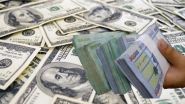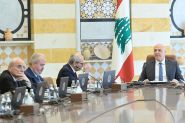“Lebanon is on the right track,” US envoys Tom Barrack and Morgan Ortagus affirmed Tuesday during their visit to Baabda, where they were received by President Joseph Aoun.
Ortagus and Barrack delivered Israel’s response to Lebanon’s proposals on the US roadmap and held discussions with President Aoun on the next steps for militia disarmament and border security.
Speaking at a press conference after the meeting, Barrack underscored that Israel is “prepared to proceed step by step with the Lebanese government” in implementing the US roadmap, in line with the reciprocity principle announced by Israeli Prime Minister Benjamin Netanyahu on Monday. He stressed that Israel “does not seek to occupy Lebanon and is ready to withdraw, but expects concrete measures to be carried out on the ground.” Barrack’s comments directly challenge Hezbollah leader Naim Qassem, who frequently accuses Tel Aviv of “expansionist ambitions” to justify the group’s continued armament.
Barrack called on Beirut to engage in direct negotiations with Israel and assured that the United States “will work with Lebanon to improve the lives of the Lebanese people, whether Iran agrees or not.”
He described Hezbollah’s disarmament process as “historic” and irreversible, noting that the pro-Iranian group is expected “to become a political party.” He added, “The Shia community represents 40% of the Lebanese population and aspires to stability and prosperity. President Donald Trump wants to see a prosperous Lebanon with weapons removed. Meanwhile, the three main power centers are doing their best to ensure Lebanon’s prosperity. Why should Hezbollah remain armed?”
UNIFIL Mandate
Barrack also outlined a plan to financially compensate Hezbollah members who surrender their weapons and stated that the Lebanese army is fully capable of ensuring stability across the country. In this context, he announced that the UNIFIL mandate, set to expire on August 31, will be extended for only one year. “We pay a billion dollars a year to UNIFIL, and Lebanon is still in a stalemate, caught between Israel and Hezbollah,” he said, emphasizing that the solution lies “with the army, not an international force.”
Regarding relations with Syria, the US envoy noted that President Ahmad al-Sharaa “wants to reach a border demarcation agreement with Lebanon and establish cooperative relations with the country.”
Remarks from Senators Shaheen and Graham
US Senators Jeanne Shaheen and Lindsey Graham, members of the American delegation, who were present at the meeting, reaffirmed US support for Lebanon’s “courageous decisions regarding national security and Hezbollah’s disarmament.”
Senator Shaheen said, “We had an extremely productive meeting with President Aoun. We support the Lebanese government’s courageous decision to disarm Hezbollah.” She added, “Although disarming Hezbollah is a difficult step, it is crucial for the country’s stability and security.” Shaheen confirmed US commitment to fund the Lebanese army’s efforts and support Lebanon’s economy to ensure the country’s security and prosperity.
Senator Graham emphasized that “Hezbollah’s agenda is not aligned with the interests of the Lebanese people” and that “Iran’s capabilities have been significantly weakened.” He noted, “Once Hezbollah is disarmed, discussions can take place regarding Israel’s withdrawal from the five points of presence in Lebanon.” Graham added, “It is in everyone’s interest to defend religious diversity in the region. We will help Lebanon move forward along this path.”
Decision of War and Peace
Later, Presidential Palace spokesperson Najat Charafeddine announced that President Joseph Aoun reaffirmed to the American delegation Lebanon’s firm commitment to the ceasefire agreement concluded with Israel in September 2024, as well as to the U.S.-proposed roadmap for Lebanon.
During the exchange, the head of state stressed that the authority to decide on matters of war and peace rests solely with the Lebanese state, thereby rejecting any legitimacy for armed decision-making outside state institutions.
The president thanked the United States for its continued support to Lebanon. He also urged Washington to maintain its diplomatic efforts with all concerned parties, as well as with Lebanon’s friendly nations, “in order to accelerate reconstruction and national recovery efforts.”
During the meeting, the U.S. delegation briefed President Aoun on the outcome of its recent visit to Damascus. On this matter, Ms. Charafeddine said the president expressed satisfaction with the responses conveyed.
The Presidency noted that the American vision for Lebanon’s recovery rests on three pillars: consolidating security by restricting weapons and decisions of war and peace to the state alone; fostering economic prosperity through the creativity of the Lebanese people, the dynamism of the private sector, and the contribution of the diaspora; and safeguarding Lebanon’s pluralistic democracy, which guarantees equality before the law and full partnership among all communities.



Comments